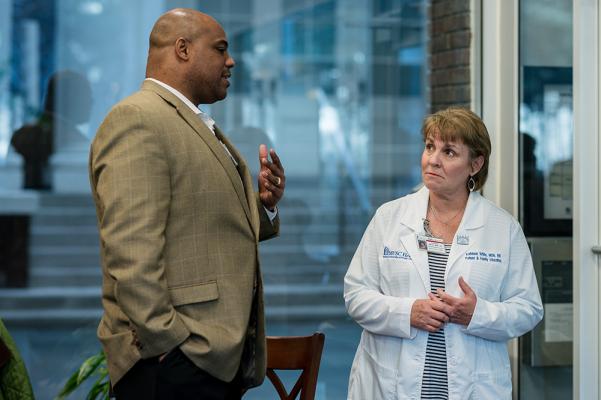
Source: MUSC Catalyst News, Helen Adams
A new hotline is the latest innovation as MUSC Health works to reach South Carolinians who might otherwise be left out of COVID-19 testing.
MUSC Health’s chief diversity officer, Anton Gunn, said that includes people without internet access, people who don’t speak English and homeless people. “That’s what keeps me up at night, thinking about the most vulnerable,” he said.
The hotline, 843-985-8888, offers screenings in English and Spanish seven days a week. It’s for people who:
- Have tried online screening for COVID-19 through musc.care and ran into technical trouble.
- Don’t have internet access.
- Have a disability that makes it tough to do online screening.
- Have been tested for COVID-19 and need follow-up information.
The hotline is staffed by people from MUSC Health’s diversity and inclusion team and about 20 medical students. They plug the patients’ answers into a survey that then goes to a health care provider for follow up. Interpreters are available for Spanish-speaking callers. The hotline is not for making appointments. (To schedule a doctor’s appointment, call 843-792-1414.)
Gunn said COVID-19 hotline callers include grandparents who love to use their smartphones to video chat with their grandkids — but aren’t comfortable using the internet. “It’s almost like old becoming new again. We all rush to technology so fast and use the internet for everything, but having an old school mechanism is allowing us to have an advancement in terms of how many underserved people get screened.”
But the hotline isn’t the only angle that Gunn’s team is focusing on. When it came to screening Charleston’s homeless community for COVID-19, Gunn said his group took a different approach.
“The homeless are our most transient population and they’re very social. They sleep in one shelter, they eat in another shelter, between that they’re on the corner of King Street and Calhoun asking for change at the Starbucks. Some people are putting money in their hands. Are they getting COVID? Are they giving COVID?” Gunn asked.
“We didn’t know. So we set up an operation where, through 180 Place, the Navigation Center and the Franklin C. Fetter Family Health Center, telehealth would give those centers a place to serve homeless underserved people from COVID-19 by creating a master account for each organization. Each patient is treated as a dependent.”
Gunn said his team will continue to think up new ways to reach people during the coronavirus crisis and beyond. “We want to work all of the barriers out.”

